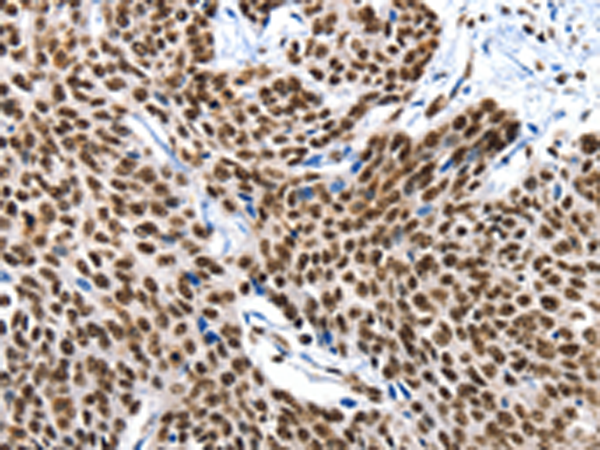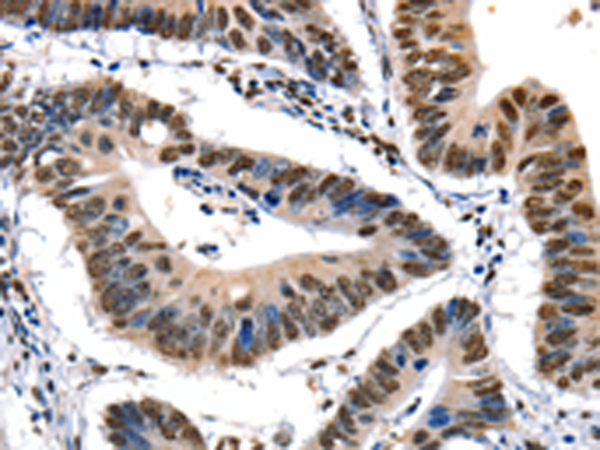

| WB | 咨询技术 | Human,Mouse,Rat |
| IF | 咨询技术 | Human,Mouse,Rat |
| IHC | 1/10-1/50 | Human,Mouse,Rat |
| ICC | 技术咨询 | Human,Mouse,Rat |
| FCM | 咨询技术 | Human,Mouse,Rat |
| Elisa | 1/1000-1/5000 | Human,Mouse,Rat |
| Aliases | ML8, KU70, TLAA, CTC75, CTCBF, G22P1 |
| Host/Isotype | Rabbit IgG |
| Antibody Type | Primary antibody |
| Storage | Store at 4°C short term. Aliquot and store at -20°C long term. Avoid freeze/thaw cycles. |
| Species Reactivity | Human, Mouse |
| Immunogen | Fusion protein of human XRCC6 |
| Formulation | Purified antibody in PBS with 0.05% sodium azide and 50% glycerol. |
+ +
以下是关于XRCC6(Ku70)抗体的3篇参考文献及其摘要概述:
1. **文献名称**:*XRCC6/Ku70 modulates PRC2-mediated gene silencing in cancer*
**作者**:Li, Y., et al.
**摘要**:本研究利用XRCC6抗体进行染色质免疫沉淀(ChIP)和免疫共沉淀(Co-IP),揭示了Ku70与多梳抑制复合物2(PRC2)的相互作用,表明其在癌症表观遗传调控中通过抑制肿瘤抑制基因发挥作用。
2. **文献名称**:*Ku70 antibody-based analysis of DNA repair dynamics in neurodegenerative models*
**作者**:Smith, J., et al.
**摘要**:通过Western blot和免疫荧光技术,使用XRCC6抗体检测神经元细胞中Ku70的表达变化,发现其在阿尔茨海默病模型中DNA损伤修复能力下降,提示其与神经退行性疾病的关联。
3. **文献名称**:*Functional interaction between XRCC6 and BRCA1 in genome stability*
**作者**:Wang, H., et al.
**摘要**:研究通过免疫共沉淀(Co-IP)和XRCC6抗体的阻断实验,证明Ku70与BRCA1在DNA双链断裂修复中的协同作用,为乳腺癌治疗中靶向DNA修复通路提供了依据。
这些文献展示了XRCC6抗体在癌症、神经科学及基因组稳定性研究中的关键应用。
The XRCC6 antibody targets the X-ray repair cross-complementing protein 6 (XRCC6), also known as Ku70. a critical component of the non-homologous end joining (NHEJ) pathway for DNA double-strand break repair. Ku70 forms a heterodimer with Ku80 (XRCC5) that binds to broken DNA ends, facilitating recruitment of DNA-dependent protein kinase catalytic subunit (DNA-PKcs) and other repair factors. This complex is essential for maintaining genomic stability, V(D)J recombination in lymphocytes, and telomere maintenance.
XRCC6 is a 70 kDa protein containing a conserved Ku domain and interacts with various partners, including DNA-PKcs, Artemis, and APLF. Dysregulation of XRCC6 is linked to cancer, immunodeficiency, and premature aging disorders. Antibodies against XRCC6 are widely used in research to study DNA repair mechanisms, cancer biology, and cellular responses to ionizing radiation or chemotherapeutic agents. They enable detection of Ku70 expression via techniques like Western blotting, immunohistochemistry, and immunofluorescence, aiding investigations into its role in genomic integrity, apoptosis regulation, and interactions with proteins like Bax or PARP1. Such antibodies are crucial tools for exploring therapeutic targets in oncology and understanding diseases associated with DNA repair deficiencies.
×